London 2012: Your Paralympic moments
- Published
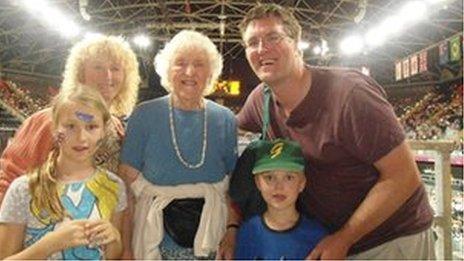
David and his family feel that the Paralympics show that there are no limits for the disabled
The London 2012 Paralympic Games have been hailed an outstanding success.
Athletes from around the globe have come to London to show the world what they are capable of achieving.
Great Britain exceeded its medal target and there have been many personal tales of courage and determination.
Here, BBC News website readers reflect on their favourite moments of the Paralympic and how the Games have inspired them.
Carole Young, Bellshill
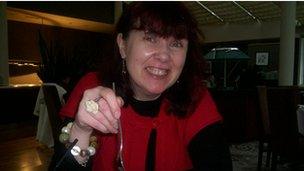
"Until recently I hated my disability. But watching the Paralympics made me look at myself differently"
Speaking as a disabled person, I think the Paralympics have done wonders in highlighting different disabilities and the potential of disabled people.
When I was just 28, I had a stroke. At first I was in a coma and completely paralysed, but then I started using a wheelchair and now use a walker. It is still quite difficult for me to get around.
Before the stroke, I had a good job and a good life but being disabled changed everything. I didn't cope with it very well.
Until very recently I hated my disability. But watching the Paralympics made me look at myself differently. Some of the athletes were blind or had no limbs. I started to feel fortunate for what I actually do have.
At the moment, I am in the process of getting back into work. Watching the Paralympic athletes has inspired me to do this. They made me feel that I could and should do something.
I have been addicted to the Games. Richard Whitehead winning gold and breaking his own world record in the 200m T42 final was incredible.
Another favourite moment of mine was Jonnie Peacock and Oscar Pistorius embracing after Jonnie won the 100m T44.
Ana Jenkins, London (originally Sao Paulo, Brazil)
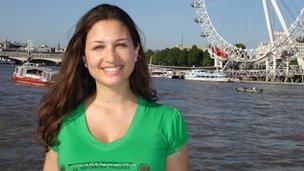
Ana hopes that the Paralympics will be just as good in Rio
I'm from Brazil, but I live in London with my husband. The Paralympics have been awe-inspiring.
Brazil's presence has grown in the Paralympic Games and it has been great to see Brazilian athletes compete and do so well.
When Brazil won first, second and third place in the 100m T11 race - the race in which blind athletes compete. It was very exciting.
Brazil is a third-world country in many respects - many of the people competing come from very poor areas and have also had to cope with having a disability.
We also went along to watch blind athletes from Brazil and Argentina play in 5-a-side football. It was incredible seeing what humans can do. Eventually, you forget the disabilities - it's just about great sport!
Unfortunately, in Brazil the Paralympics have not been on TV much. Often people who are disabled are hidden from society. I think things will change though. I hope they will. I am hoping to go to Rio in 2016 when we host the Olympics and Paralympics.
We have the athletes, teams and the talent. Rio 2016 will give the Brazilian population the opportunity to learn more about disability.
The Paralympics have really made me think - if a blind person can play football and can score in a penalty shoot-out, then what can I do? Humans are capable of amazing things.
Pauline Stanley, London
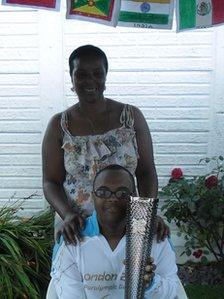
Pauline is very proud of her son David, who was a Paralympic torchbearer
Seeing my son David carry the Paralympic torch was brilliant. David is disabled - he was born with Down's Syndrome. He has achieved amazing things during the past 30 years and I am so proud of him.
People with disabilities need opportunities - they need to be given the chance to do things.
The Paralympics have moved me to tears a number of times. Watching the blind runners was incredible. Although I don't have a disability myself, I can empathise with the challenges they face and how they overcome them.
We have made a lot of progress in this country, but there is still a long way to go. I've been to many developing countries and and seen that people with disabilities are treated differently. Often they just become helpers in the house and don't go on to do much more.
The Paralympics are a brilliant opportunity for people around the world to see what humans who have faced big challenges can achieve.
We went along to watch a race and David said, 'I want to do that.' It's amazing seeing what these people can achieve and what they have done. It has really told me, 'where there's a will, there's a way'!
I take my hat off to the Paralympians; they have inspired everybody.
David says:
Carrying the torch was really great. I enjoyed myself - it was really exciting! We went to see the volleyball and the tennis. It was great. I think my favourites were the swimming and running, though I liked the boccia too.
Toby Allnutt, London
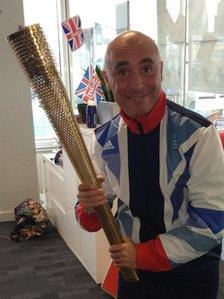
Toby has been inspired to raise money to help disabled children get into sport
I've enjoyed every minute of the Paralympics. It was a great moment when David Weir won the 800m T54 final. It was his third gold medal of the Games, and also the prelude to the 100m T44 final, which Jonnie Peacock won. The atmosphere was electric.
If I am really honest, I thought the Paralympics would be uncomfortable viewing. I was one of those people who would rather look away when disabled people were on TV.
The second day of the Paralympics, I watched Tao Zheng from China win the men's 100m backstroke S6. To see somebody with no arms win in world record time makes you look long and hard at yourself and think what good you can do for other people like him.
I'd wanted to run a marathon for ages and watching the Paralympics finally gave me the nudge to sign up. I wanted to raise money for a charity that was associated with the Paralympics and decided on a charity that helps disabled kids get into sport. The charity I chose helped David Weir in his Paralympic pursuits.
It makes me very proud to raise money for a charity that means so much to him. He is an inspiration.
Watching people achieve extraordinary things when they have no legs, no arms or are blind you start to think differently. If they can do it with the difficulties they have to go through, I can certainly do something to help them.
David Batt-Rawden, Wootten, Oxfordshire
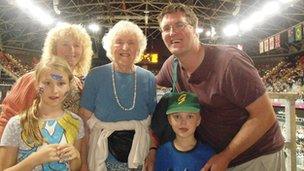
David and his family feel that the Paralympics show that there are no limits for the disabled.
My wife Susan Batt-Rawden (nee Wilson) was able-bodied for 38 years prior to being diagnosed with Motor Neurone Disease in July 2008.
Within six months she could not walk at all. However we managed to secure an electric wheelchair and she could take our daughter Hannah to school.
Sadly, Susan passed away in December 2010.
I bought 12 Olympic Park passes because, as a family, we have had first-hand experience of disability and I thought it would be a bit of a tribute to Susan.
Her "Paralympic events" were what people take for granted, including enduring two hours to get ready by carers so she could take our daughter to school, and learning to type with her opposite hand when her writing hand stopped working etc.
What the Paralympics have shown the world is that disability is here and those who live with it are certainly disabled. However, apply technology, be it blades, wheelchairs, or hand bikes, for the disabled person there are no limits to what can be achieved.
Ran Fei, London
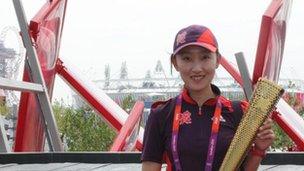
Ran Fei, a volunteer, will have life long memories of both the Olympics and Paralympics
I was an Event Service volunteer in the Olympic Park during the Olympics and Paralympics. Although I had to get up at four in the morning for my early shifts and stay up until midnight during my evening shifts, it was indeed great fun to be involved in the Games.
You can't tell how excited the spectators were, how proud the athletes and how inspiring the sponsors were until you see them and are in contact with them.
I won't forget the night lining up with thousands of 'Honour of Guards' children, waving athletes into the stadium during the opening ceremony. Most of the children lost their voices after cheering every participating country so many times.
I won't forget the nights giving high-fives to leaving spectators at the Stratford gate.
Volunteering to me is not just giving but also receiving. There was lots of trust and appreciation from Locog, from spectators, from attendees and from other volunteers.
My volunteering journey hasn't finished. I am sure I will miss these past days and cherish this invaluable experience for the rest of my life.
- Published10 September 2012
- Published9 September 2012
- Published8 September 2012
- Published13 August 2012
- Published8 August 2012